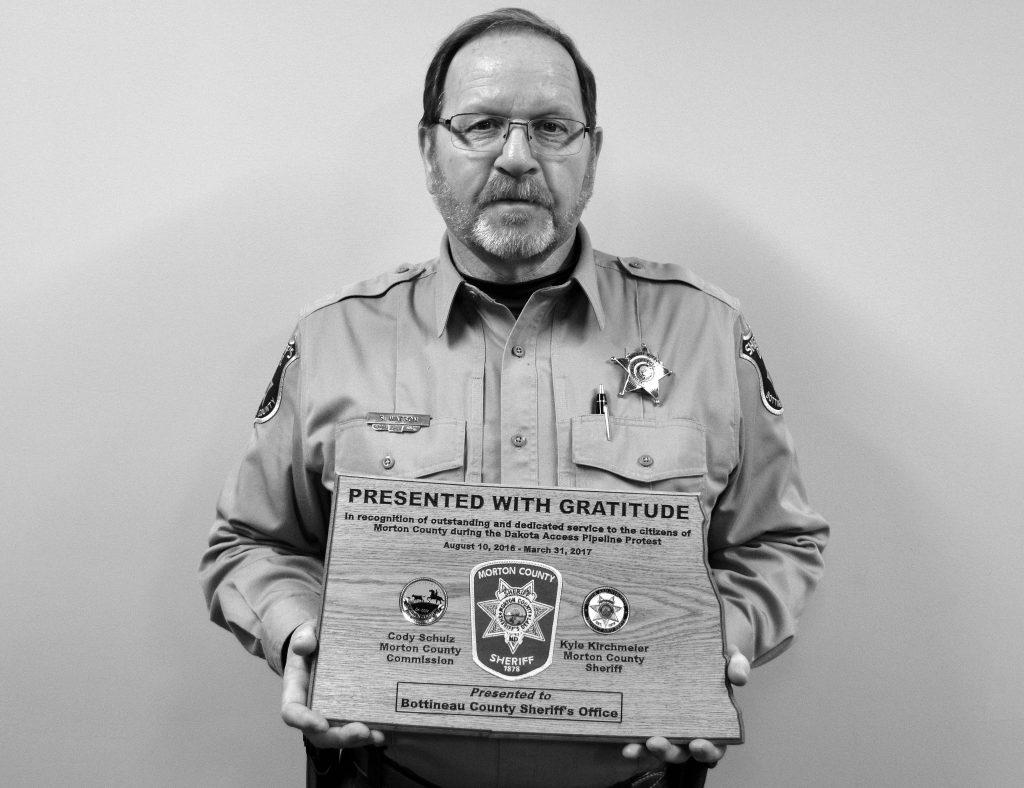

In 1989, Steve Watson started as a deputy officer in the Bottineau County Sheriff’s Department. At the end of this year, he will quickly tell you that his career will have spanned exactly 33 years, 4 months, and 17 days. 24 years of which he was the elected sheriff. What are some of the highs and lows of being a rural county Sheriff in north central North Dakota? Sheriff Watson tells you in this interview.
What was your experience with Law Enforcement before you became the Sheriff in 1999?
While attending Minot State University, I was offered a law enforcement internship to work at a North Dakota State Park as a Park Ranger. I chose Lake Metigoshe State Park. I worked there that summer and for the next two summers. That is where my interest in law enforcement started.
In 1989, I was hired by Bottineau County Sheriff Roger Hall to work as a city deputy with the Bottineau County Sheriff’s Department. In 1991, I was moved to a County Deputy. In 1992, Sheriff Hall appointed me as his Chief Deputy and I held this position until I was elected as Bottineau County Sheriff in 1998.
In 24 years, how many times were you challenged with an opponent in an election?
In the 24 years as Bottineau County Sheriff, I was challenged four times and ran two times unopposed for a total of 6, 4-year terms.

What's been the best part of being the Bottineau County Sheriff?
The best part of being the sheriff of Bottineau County is the people. Many of whom I consider longtime friends. I especially love watching the young children of our communities growing into adulthood.
Working with other agencies, whether it be our neighboring county departments or the State Highway Patrol. By giving 100% plus to them over the years, I have built a strong name for myself and therefore gaining their trust and respect.
The best part is when you can save another’s life whether it be from helping an adult or child from choking, or to talking someone down who wants to commit suicide. Just being there to help makes a big difference.
What's been the worst part about being the Sheriff?
The worst part I have to say is doing a death notification. Being there for that family and helping them to understand. Just being there and showing kindness can be the simplest thing, but also the most important.
The second worst part of the job is domestic situations, especially where there are kids involved. Things can turn sour fast, so you must be constantly aware of your surroundings. Trying to deescalate the situation and keep everyone safe can be incredibly challenging.
What is the biggest challenge for your successor?
Biggest challenge for the new sheriff is earning the people’s trust and respect. Without this, you have nothing. Remember this position is not a 9 to 5 job. Make a name for yourself that you can be proud of.
What are you most proud of in your career?
I’m most proud of being a person that people can trust and respect. I have people come up to me all the time to say hello or how are you doing. Whether it be the people I have met in my job or other agency personnel, it shows you that you have made a difference in someone’s life.
Working with the Attorney General Wayne Stenehjem on the need for a BCI Agent to be stationed here in Bottineau. This was accomplished with his assistance and the many meetings that we attended to get this position.
Writing of grants with the biggest one being the Stone Garden Grant, which has helped our Sheriff’s Department obtain overtime in helping to watch for people trying to cross into the U.S. illegally. Keeping an eye on individuals trying to smuggle illegal drugs into the U.S. by crossing our Canadian borders. This grant has also helped our Sheriff’s Department which enables us to purchase equipment, like bullet proof vests, fully loaded vehicles, computers, along with radios just to name a few. This has helped tremendously with our county budget. Another thing is that this grant enables us to do is help the Border Patrol at the border and puts another deputy that can also go to other issues that arise in Bottineau County.

What will you do in retirement?
In retirement, it will allow more time with family and friends without having to be called out on situations. I’ll have the time to enjoy my many hobbies like fishing, hunting, camping, and metal detecting. Since I will still have my law enforcement license, I would be open to helping the department when needed if something were to come about.